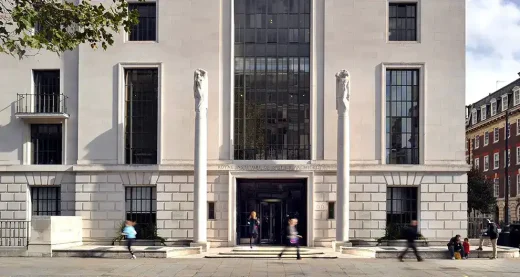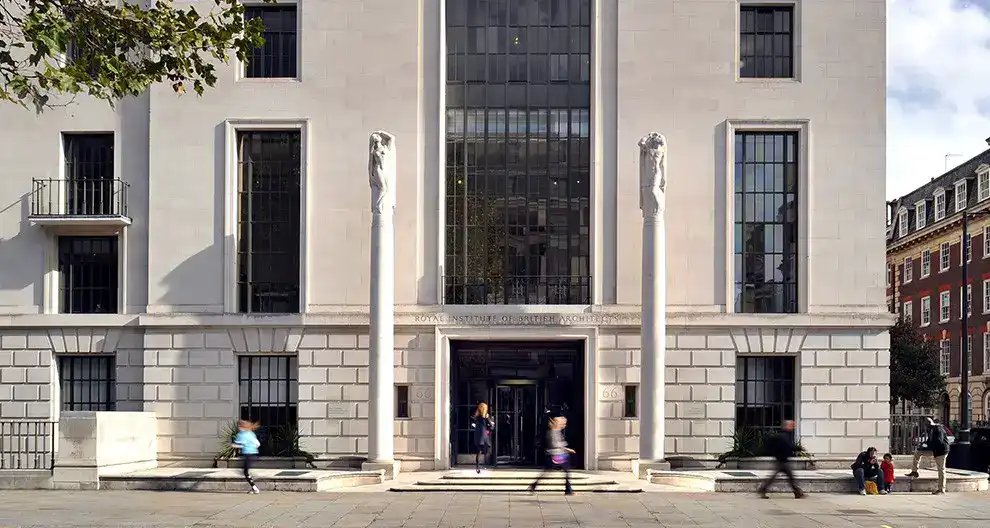RIBA news events 2025, Architecture Gallery London, UK buildings, British architects practices
RIBA News Events 2025
Royal Institute of British Architects exhibition, talks & events in London, England, UK future trends
22 May 2025
RIBA South Awards 2025 winners news
16 May 2025
2025 RIBA Southeast Award Winners
16 May 2025
2025 RIBA East Midlands Award Winners
15 May 2025
RIBA voices concerns that UK Government measures to lower legal immigration may affect pipeline of available talent in sector.
RIBA has responded to the government’s White Paper on reducing immigration which was published 12 May.
RIBA President, Muyiwa Oki said:
“The government’s decision to reduce the number of international workers and students comes at a time when they have ambitious plans to drive growth, including delivering 1.5 million new homes.
Architects are vital to achieving this, but the sector has a significant skills shortage. We need an immigration system that helps plug these gaps.
“We welcome the desire to nurture homegrown talent, and we continue to champion new and accessible routes into the profession, such as apprenticeships. But the potential of defunding Level 7 apprenticeships puts this at risk.
“We continue to work with the Government to ensure a pipeline of talent in the architecture sector and drive growth across the country.”
14 May 2025
2025 RIBA London awards winners, buildings + architects
13 May 2025
RIBA Bookshop at 66 Portland Place News

photo © James Loveday
RIBA Bookshop London 66 Portland Place
10 May 2025
RIBA South West & Wessex Awards 2025 winners
9 May 2025
RIBA Yorkshire Award winners 2025 Winners
post updated 2 May 2025
2025 RIBA West Midlands Awards Winners
1 May 2025
SANAA receives King’s Royal Gold Medal for Architecture
RIBA Gold Medal for Architecture 2025 Winner
24 April 2025
RIBA Future Trends March 2025 News
The Royal Institute of British Architects just published their latest report on architecture business and employment trends, RIBA Future Trends March 2025. The report shows that practices are largely optimistic about future workloads, and the sectoral outlook is improving particularly in the housing and commercial sectors. However, British architectural practices are braced for rising costs expected in April. March’s data also precedes the global market turmoil caused by the introduction of trade tariffs by the US President.
Adrian Malleson, RIBA Head of Economic Research and Analysis, said:
“March’s data is, on the face of it, encouraging. Practices in all regions are optimistic about future workloads. The sectoral outlook is improving, with increasing optimism for the Housing and Commercial sectors, and reducing pessimism in the Community sector.
The announced increase in government capital spending, the expectation of increased housing construction, and the intended reform of the planning system may improve future workloads.
The +7 Workload Index of March 2025 compares well with the zero figure of March 2024.
After a challenging 2024, it looks as if the first quarter of 2025 sees a corner turned, with an increasingly positive outlook for the coming three months.
However, global uncertainty and the market turmoil created by the introduction of trade tariffs cast a shadow over March’s optimism.
Heightened uncertainty is likely to reduce client willingness to commission new projects. The RIBA will continue to monitor developments closely.
Commentary received from practices in March gives a mixed picture. Some architectural practices describe a flat or suppressed market, with the ongoing challenges of planning delays and fee pressure. Architects practices have also highlighted the increased costs they, contractors, and clients will face in April.
Other practices offer a more upbeat assessment of the current market, describing areas of growth in the residential market, increased enquiries, and rising hope for 2025.”
24 April 2025
RIBA and The King’s Foundation join forces to champion retrofit
The Royal Institute of British Architects (RIBA) and The King’s Foundation today announced the launch of a new initiative to champion retrofit, promote the reuse of existing buildings, and spotlight the local skills and expertise needed to make it happen.
Building on the success of a community-reuse pilot event, hosted jointly by RIBA and The King’s Foundation in Fleetwood Lancashire, the new collaboration will feature two further regional events taking place this year. These events will bring thought leaders together to spark dialogue, share best practice and support cross-sector action on reuse in the built environment at a local level.
Retrofit – the upgrading of existing buildings to improve their energy efficiency, longevity, and flexibility – has been a core pillar of Muyiwa Oki’s RIBA presidency and aligns closely with The King’s Foundation’s work to promote harmony between the built and natural environments. The Foundation has worked on the repurposing of many existing buildings including Dumfries House in Ayrshire, Fleetwood Hospital in Lancashire, and Drapers Hall in Coventry.
The first event, “Reimagining resources – Buildings, crafts and materials ” will be held on 3 July at The Glove Factory Studios, Bradford on Avon, Wiltshire. The second event, planned for September 2025, will explore the importance of retrofit in creating healthy indoor environments.
Both events will feature expert panel discussions, interactive workshops and demonstrations, offering insights into how we can reuse existing buildings and materials to create a more sustainable built environment.
RIBA President, Muyiwa Oki, said:
“We know that around 80% of the buildings that will be in use in 2050 already exist. If we’re serious about cutting carbon emissions, preserving heritage, and creating spaces that really serve our communities, we must continue to push retrofit up the national agenda.
I’m excited to continue our collaboration with The King’s Foundation, building on our successful pilot in Fleetwood to deliver two dynamic events that will bring together the key players from across our built environment. These events will provide spaces for conversations, collaborations and demonstrations of the local skills and expertise needed to make retrofit a success.”
Architect and Associate Director at The King’s Foundation, Sarah Robinson, said: “Repurposing existing buildings is vital not only because of their carbon value but because of their inherent social value as the backdrop to our daily lives and the glue of existing communities. Finding new uses for these buildings can create exciting challenges for the next generation of architects. At The King’s Foundation, we champion the sustainable regeneration of buildings, so we are excited to be collaborating with RIBA to establish a forum for engaging conversations.”
Tickets for the first event will be available in May on architecture.com
17 April 2025
RIBA initial reaction to ARB’s Independent Commission on professional practical experience (PPE)
• The ARB’s independent Commission on professional practical experience (PPE) in architecture has published the results of its year-long investigation into the challenges faced by future architects in seeking suitable work experience.
• RIBA gives its initial reaction to the insights and re-states the importance of more flexible modes of study and routes into architecture to secure and maintain a skilled workforce to deliver desperately needed high quality housing.
Chair of RIBA Board of Trustees, Jack Pringle said:
“Training and retaining highly skilled architects from all walks of life is vital to deliver the quality homes we so desperately need and address societal challenges such as achieving net zero.
But to ensure a brilliant and diverse pipeline of talent into the profession we need fresh thinking and new approaches, starting with modes of study, which should be more flexible and, in some cases, shorter.
We are particularly keen to see the development of a five-year admission to registration route emerging as a viable educational model, and will work with schools and the ARB to support this development.
I’m encouraged by some of the findings from the ARB’s PPE Commission, not just because they reflect many of our own insights, which we are already addressing, but also because some of the issues that have emerged will give us an opportunity to reflect on what more can be done.
However, education reform, particularly around practical experience, has been far, far too slow in coming, and I hope that the ARB Board will now act quickly in response to the Commission’s recommendations. In particular, recommendations that improve accessibility to the profession by removing unnecessary barriers to entry and requiring PPE to be outcome rather than time based, should be strongly encouraged.
Some of the recommendations have significant implications for learning providers, so we are ready to engage with ARB, students and practices to help ensure that all routes into learning and professional practice work for all.”
11 March 2025
RIBA welcomes new Planning and Infrastructure Bill
The Royal Institute of British Architects (RIBA) has welcomed the sweeping changes to the planning system which the Government has outlined today (11 March 2025) in its Planning and Infrastructure Bill, in order to deliver 1.5million homes by 2030.
The Bill, which was announced by the Deputy Prime Minister and Secretary of State for Housing, Rt Hon. Angela Rayner MP, proposes measures aiming to speed up planning decisions and deliver necessary development.
RIBA’s President, Muyiwa Oki said:
“This is a welcome shot in the arm for the construction industry. To ensure the much needed high quality housing and infrastructure, urgent action is required.
However, to deliver the seismic changes proposed, local planning departments will need to be adequately resourced and supported with the right people, skills and design expertise they need. We look forward to examining the Bill and working with the Government to ensure we create well-designed homes and places that meet the needs for communities to thrive.
The Bill signifies a step in the right direction to speeding up the planning system. What’s not in question is the desperate need to build quality homes and vibrant places up and down the country.”
20 February 2025
RIBA Future Trends January 2025
The Royal Institute of British Architects have just published their latest report on architecture business and employment trends, RIBA Future Trends January 2025. The report shows that over the next three months, architects expect falling workloads, although the outlook is slowly improving. Staffing levels are expected to fall as practices are increasingly cautious about recruitment, but staff numbers are reported to remain roughly the same as last year.
Adrian Malleson, RIBA Head of Economic Research and Analysis, said:
“In the context of an under-performing economy and global uncertainty, the architects’ market remains challenging. The profession remains pessimistic about future work. For the third consecutive month, the RIBA Future Workload Index is negative, indicating that practices continue to anticipate workloads falling in the near term.
Most sectors and regions anticipate falling workloads. Expectations for future staffing levels are also negative, with practices reporting that coming changes in employer National Insurance Contributions (NICs) are dampening recruitment plans. Nevertheless, this month’s report does provide some cause for optimism. The Workload Index has risen for the second successive month, workloads are expected to grow in the capital, the outlook for the housing sector is no longer negative, and staffing levels held steady through a difficult 2024.
Commentary received from practices in January reflects a weak architectural market, with continued reports of intense fee competition, a lack of new enquiries, and insufficient work in the pipeline. The slow progress of planning applications still restricts project progress. Architecture practices report planned increases in NICs making future recruitment less likely and lessening the scope for staff pay rises. Some are considering redundancies.
Practices also describe policy and regulation changes negatively affecting workloads, including changes to the Building Regulations, the Listed Places of Worship VAT rebate Grant Scheme, and High-Risk Building procedures. Nevertheless, some practices describe thriving businesses, with some noting strong demand for office projects, ongoing work from established clients, growing opportunities overseas, and an anticipation of an improving market this year.”
Previously on e-architect:
13 February 2025
RIBA responds to plans for new towns and affordable homes
The Royal Institute of British Architects (RIBA) has today, Thursday 13 February 2025, reacted to the Government’s plans to build a new generation of new towns and invest £350 million in the supply of affordable and social housing, both announced this week.
A funding top-up promises to deliver 2,800 affordable homes, with half designated for social rent, plus 250 more council homes.
It was also announced that over 100 sites in England have come forward to be considered for the development of new towns, and the New Towns Taskforce has set out principles for new towns to deliver affordable housing, infrastructure and access to green spaces.
RIBA President Muyiwa Oki said:
“The Government has made no bones about its ambition to address the housing crisis, and this week’s announcements put positive intentions into action.
We welcome the focus on ensuring new towns are well-designed and provide communities with both affordable housing and essential infrastructure and amenities.
Delivering new homes is crucial to the Government’s growth agenda. While we’re pleased to see funding committed to this, notably for affordable housing and unlocking brownfield and council-owned sites, it will take innovative solutions to meet the scale of need.
We outlined one way to deliver a pipeline of new social housing in our Foundations for the Future report. Our model could reduce the cost of delivering social housing by using public land to build mixed-tenure developments, and reinvesting profits. It’s time to try ideas like this to secure the future of our housing.
We look forward to continuing our work with the Government to achieve this shared goal.”
Read the report: Foundations for the Future: a new delivery model for social housing
+++
12 February 2025
RIBA condemns ‘ill-advised’ ARB accreditation rule
The Royal Institute of British Architects (RIBA) has today, Wednesday 12th of February 2025, responded to the Architects Registration Board’s (ARB) decision to keep the wording of its Accreditation Rule 4.2: Degree awarding powers, which it changed from ‘qualification awarding powers’ to ‘degree awarding powers’.
This means ARB will require any learning provider applying for accreditation of a master’s level or equivalent qualification to have degree awarding powers, or a formal agreement with a body with such powers. Learning providers who do not hold degree awarding powers or a formal agreement with a body with such powers will be disqualified from ARB accreditation.
In November 2024, RIBA responded to ARB’s consultation on the rule, warning it posed a barrier to learning providers that supply innovative, flexible routes to become an architect.
RIBA is a provider of architectural education with “qualification awarding powers” through the RIBA Part 3 and RIBA Studio programme (equivalent level to a Part 1 bachelor’s and Part 2 master’s degree).
In response to ARB’s decision, Chair of RIBA Board of Trustees Jack Pringle said:
“Since 1837, our Royal Charter has enshrined our ability to award our own qualifications, granting us the independence to award certificates and diplomas in our own right. Our current RIBA Studio diploma is already recognised as a master’s level equivalent qualification and our external examiners recognise this in their reports. ARB’s decision is a direct assault on the powers granted to us in our charter.
We are pleased to partner with Oxford Brookes University for the delivery of RIBA Studio, and the terms of our arrangement mean that we continue to satisfy Accreditation Rule 4.2. However, ARB’s decision fetters our ability to seek further different routes to qualification, that we may wish to devise in parallel. This is of great concern.
In addition, this ill-advised move could disproportionately affect future alternative learning providers, preventing them from offering new qualifications that could particularly benefit students who face barriers to accessing education due to finances or caring responsibilities.
We continue to advocate for an inclusive architecture education system that works for all.”
Previously on e-architect:
29 January 2025
RIBA responds to the Government’s plan to deliver new homes and national infrastructure
Wednesday 29th January 2025 – The Royal Institute of British Architects (RIBA) has responded to the Government’s plans to deliver new homes and national infrastructure. The Chancellor of the Exchequer made the announcement in a speech today in Oxfordshire.
Muyiwa Oki, President of the Royal Institute of British Architects, said:
“The Government’s focus on delivering new homes and national infrastructure is great news – these are essential drivers for economic growth and moves to unlock land near transport hubs can be transformative.
We need vibrant, well-connected neighbourhoods with everything from accessible transport to green space and bustling local centres.
But quality matters when creating new developments. Architecture plays a crucial role in ensuring that new places are sustainable, liveable and fit for the future. We remain ready to work with government to meet this challenge head on.
We look forward to seeing more detail in the forthcoming Planning and Infrastructure Bill.”
+++
Previously on e-architect in late 2024:
13 December 2024
Architects expect falling workloads and staffing levels
The Royal Institute of British Architects published their latest report on architecture business and employment trends, RIBA Future Trends November 2024. The report shows that over the next three months, architects expect falling workloads and staffing levels.
Adrian Malleson, RIBA Head of Economic Research and Analysis, said:
“This month sees a sharp fall in sentiment about the next three months, with the RIBA Workload Index returning a negative figure for the first time since February. The growing optimism of the second half of the year has now dissipated. A further fall in the Private Housing outlook is particularly concerning for smaller practices. Plans for recruitment reflect the dampened outlook, with practices now more likely to anticipate staff reductions than increases. The recent budget has not brought market confidence.
Commentary received from practices in November describes a tough market. Planning delays continue to hinder project progress, fee competition remains intense, and some clients are paying late for services. These combined challenges weigh down on practice profitability. Some practices report concerns that, following the budget, inflation and interest rates will be higher than was expected. Nevertheless, some practices strike a more positive note, describing an increase in enquiries and expectation of new work secured for 2025, as interest rates further fall.”
13 December 2024
‘A promising path forward’ : RIBA reacts to National Planning Policy Framework shake-up
The Royal Institute of British Architects (RIBA) has reacted to the revised National Planning Policy Framework, published today, Thursday 12 December 2024.
RIBA President, Muyiwa Oki, said:
“Today’s revisions to the National Planning Policy Framework offer a promising path forward.
Enhanced emphasis on design quality and sustainability reflects a clear understanding of what constitutes good design, paving the way to create places where people truly want to live.
Significant moves to review the use of the greenbelt and define the meaning of grey belt land, while prioritising brownfield development, also signal a willingness to tackle some of the most pressing barriers to large-scale development.
To ensure success, two critical interventions are needed: greater involvement of architects and greater resource for local planning authorities.
Most importantly, this cannot become a solely numbers-driven exercise. In our cities, towns and countryside people deserve high-quality, well-designed homes that meet their needs and stand the test of time.”
RIBA 66 Portland Place in London, England, UK:

Previously on e-architect:
RIBA UK News Archive
+++
RIBA HQ Refurbishment
RIBA HQ refurbishment, 66 Portland Place
RIBA HQ Building
RIBA HQ at 66 Portland Place
+++
Royal Institute of British Architects Awards
Serjeant Award for Excellence in Architectural Drawing News
RIBA Serjeant Award for Excellence in Architectural Drawing
2022 RIBA Charles Jencks Award News
2022 RIBA Charles Jencks Award
RIBA Reinvention Award News
RIBA Reinvention Award
RIBA Gold Medal for Architecture
London Architecture Events
Bartlett School of Architecture Event
Architecture Design
Contemporary Building Designs – recent architectural selection from e-architect below:
Comments / photos for the RIBA News & Events for 2024 page welcome





